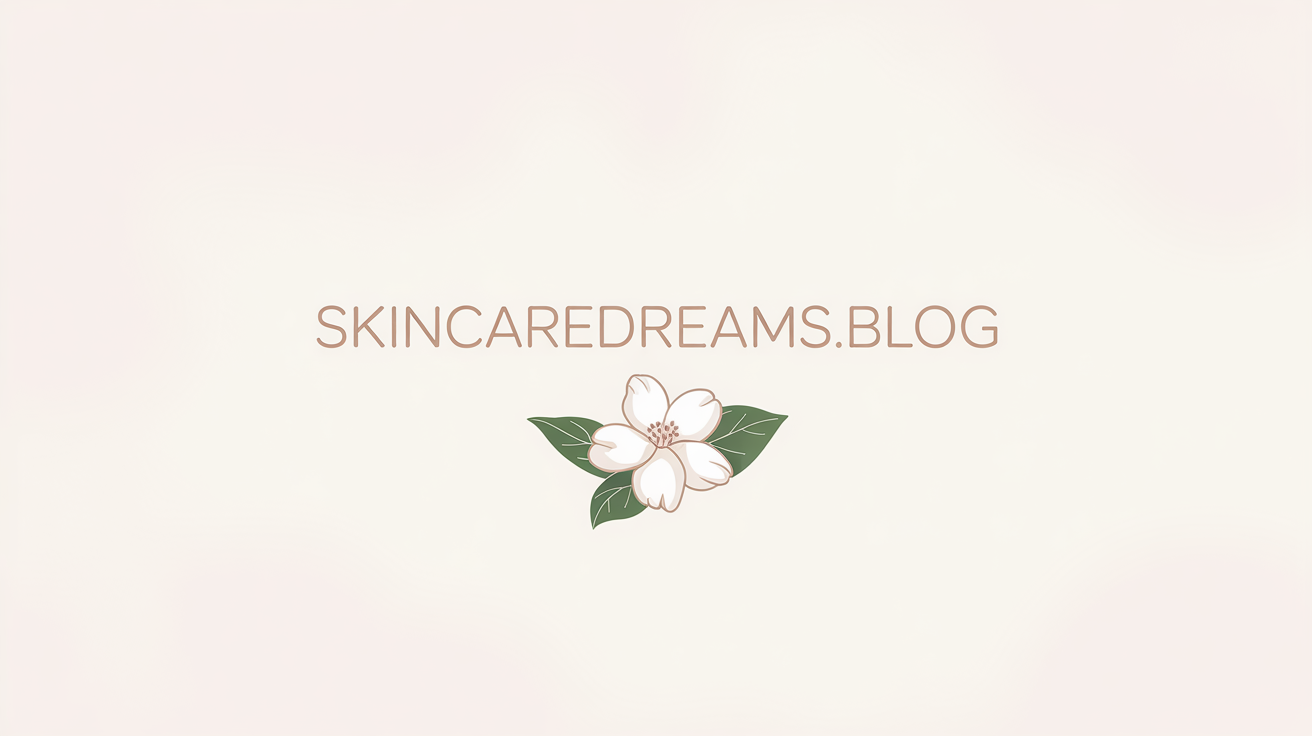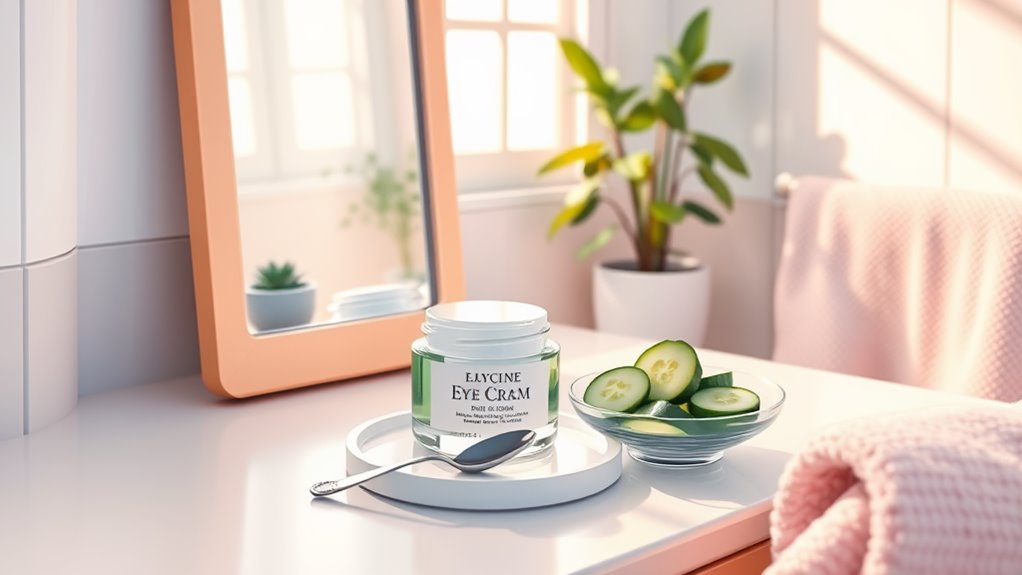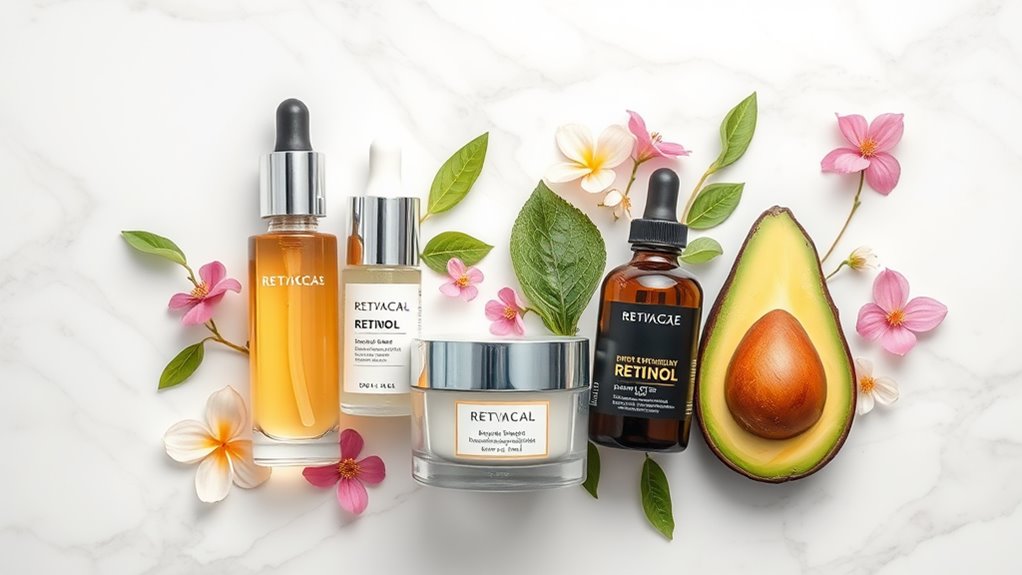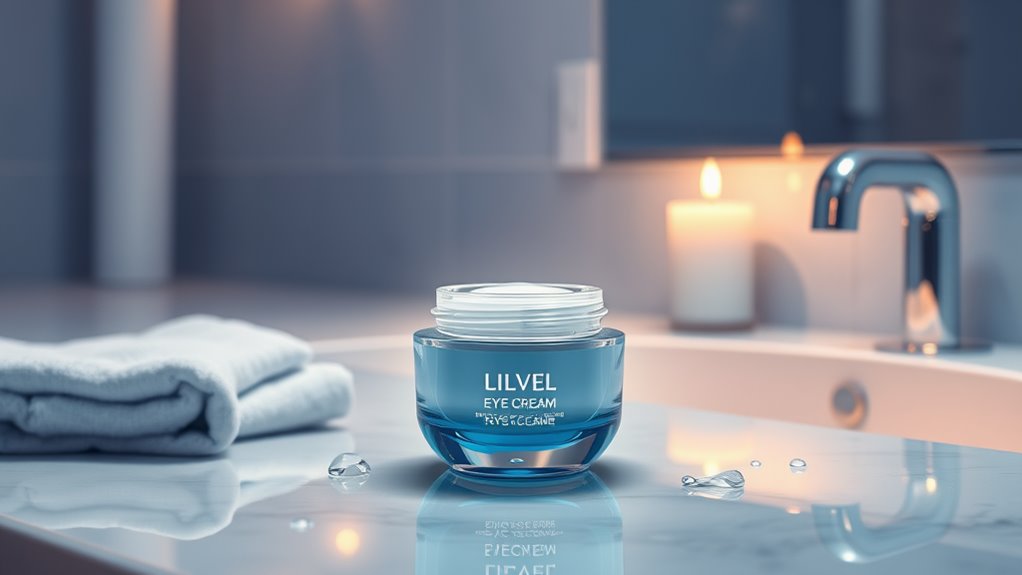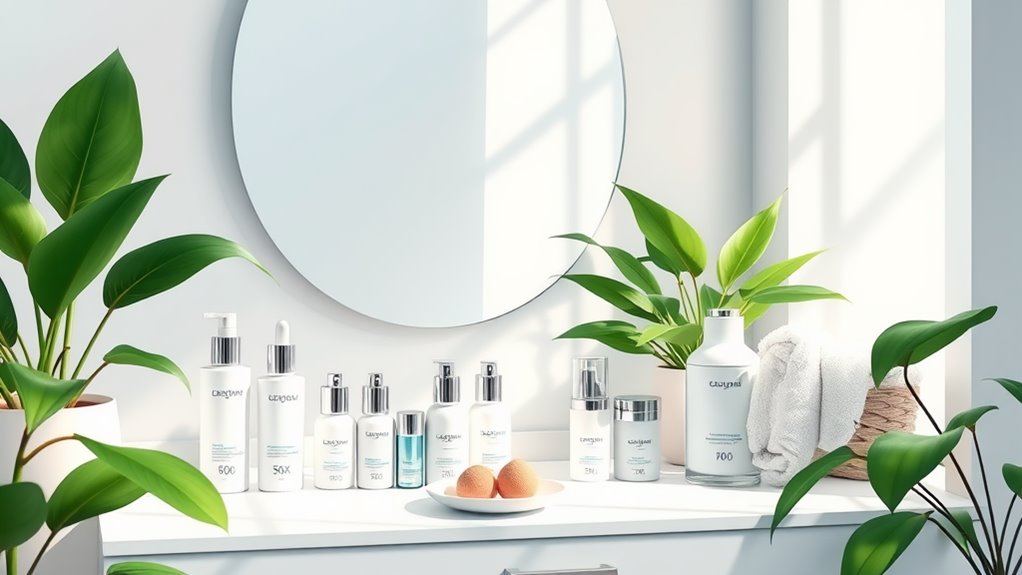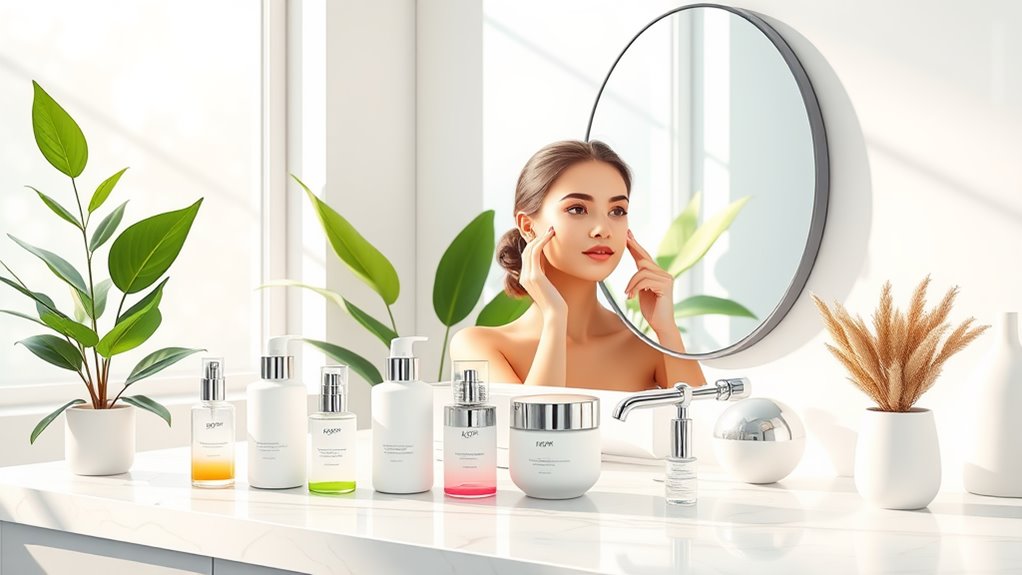Say Goodbye to Puffy Eyes With This Trick
If you’ve ever woken up to puffy eyes, you know how frustrating it can be. But there’s a simple trick that can help you tackle this issue effectively. By using chilled green tea bags, you can reduce swelling and soothe inflammation in just a matter of minutes. Curious about how this remedy works and what other methods can keep your eyes looking fresh? Let’s explore the science behind puffy eyes and the solutions to combat them.
Key Takeaways
- Place chilled cucumber slices or spoons over your eyes for a soothing effect and to reduce swelling.
- Use cold tea bags, like green or chamomile, to help alleviate puffiness and inflammation.
- Gently massage the eye area to promote circulation and lymphatic drainage, reducing fluid buildup.
- Apply an eye cream with caffeine to constrict blood vessels and diminish swelling effectively.
- Stay hydrated and limit salt intake to prevent fluid retention and maintain long-term eye health.
Understanding Puffy Eyes: Common Causes
Understanding why you might wake up with puffy eyes can help you tackle the issue more effectively. Several common factors contribute to this condition.
Allergies are a leading cause, causing inflammation and swelling around your eyes. Lack of sleep also plays a significant role; when you don’t rest enough, your body retains fluid, leading to puffiness.
Additionally, excess salt in your diet can cause fluid retention, making those bags under your eyes more noticeable. Aging is another factor, as the skin loses elasticity over time.
To improve your eye care routine, consider addressing these issues by managing allergies, ensuring ample sleep, moderating salt intake, and incorporating products that promote skin firmness. Common eye skincare mistakes can exacerbate puffiness, so be mindful of your application techniques and product choices.
Master these elements for a more refreshed appearance.
The Science Behind Eye Puffiness
Eye puffiness can stem from various factors, including fluid retention and skin aging.
When you don’t get enough rest or consume too much salt, your body might hold onto fluid, leading to that swollen look.
Plus, as your skin ages, it loses elasticity, making puffiness more noticeable. Additionally, common daily habits can exacerbate the appearance of puffiness, highlighting the importance of maintaining a youthful skincare routine.
Causes of Eye Puffiness
Although many factors contribute to puffiness around the eyes, fluid retention is often the primary culprit. This puffiness can stem from various sources, including lifestyle choices, environmental conditions, and genetic predispositions.
For instance, a lack of sleep or excessive alcohol consumption can disrupt your body’s natural balance, leading to inflammation. Allergies can also trigger a histamine response, causing the tissues around your eyes to swell.
Additionally, aging plays a significant role; as skin loses collagen and elasticity, it may accumulate more fluid. Understanding these causes empowers you to identify patterns in your life that exacerbate eye puffiness.
Fluid Retention Factors
When your body retains fluid, it can lead to noticeable puffiness around your eyes, often making you look tired or unwell. Several factors contribute to this fluid retention.
High sodium intake from processed foods can cause your body to hold onto water, intensifying the puffiness. Hormonal fluctuations, especially during menstruation or pregnancy, can also play a significant role in fluid balance.
Allergies may trigger inflammation and swelling, leading to excess fluid accumulation. Additionally, lack of proper hydration might prompt your body to retain water as a defense mechanism.
To combat these factors, focus on a balanced diet, stay hydrated, and manage allergens. By addressing these elements, you can reduce puffiness and achieve a brighter, more refreshed appearance.
Skin Aging Effects
As you age, your skin undergoes various changes that can lead to increased puffiness around the eyes. Collagen and elastin production declines, resulting in less firm skin. Additionally, fat pads around your eyes may shift, contributing to a tired appearance. Understanding these changes is essential for combating puffiness effectively.
| Factor | Effect on Eyes | Solution |
|---|---|---|
| Decreased Collagen | Loss of elasticity | Use collagen-boosting creams |
| Fat Pad Shifting | Increased puffiness | Opt for targeted eye treatments |
| Thinner Skin | More visible veins | Hydrate and moisturize |
| Fluid Retention | Swelling | Reduce salt intake |
Addressing these factors can help you achieve a more youthful look and reduce that pesky puffiness.
Home Remedies for Instant Relief
If you’ve woken up to puffy eyes and need instant relief, several home remedies can help reduce swelling quickly.
First, chilled spoons or cucumber slices can work wonders; simply place them over your eyes for about 10 minutes.
You might also try cold tea bags, particularly green or chamomile, which contain soothing properties. After steeping, chill them in the fridge before application.
Another effective option is a gentle massage around your eye area using your fingertips to promote circulation and lymphatic drainage.
Finally, applying aloe vera gel can provide a revitalizing effect and minimize puffiness.
Each of these remedies is simple, yet they can offer significant relief and help you look rejuvenated in no time.
The Role of Hydration in Reducing Puffiness
Staying hydrated is essential for reducing puffiness around your eyes.
When you drink enough water and eat hydrating foods, you help maintain your skin’s elasticity and overall appearance.
Importance of Water Intake
Drinking enough water each day can greatly impact the appearance of puffy eyes. Proper hydration helps your body flush out excess salt and toxins, reducing inflammation and puffiness around the eyes. When you’re dehydrated, your body retains water, leading to more pronounced swelling. To master your hydration, consider tracking your intake through methods like the table below:
| Time of Day | Water Intake Goal |
|---|---|
| Morning | 16 oz (2 cups) |
| Afternoon | 32 oz (4 cups) |
| Evening | 16 oz (2 cups) |
Foods That Hydrate
Hydration isn’t just about drinking water; certain foods can also play a significant role in keeping you hydrated and reducing puffiness around the eyes. Incorporating water-rich fruits and vegetables into your diet is essential.
Cucumbers, for instance, are about 95% water and can help flush out excess sodium that contributes to swelling. Similarly, watermelon, with its high water content, not only hydrates but also provides antioxidants that combat inflammation.
Leafy greens like spinach and kale are excellent choices, packed with water and nutrients. Don’t forget about citrus fruits—grapefruits and oranges aren’t only invigorating but also help maintain hydration levels.
Hydration and Skin Elasticity
When your skin is well-hydrated, it maintains its elasticity, which can greatly reduce puffiness around the eyes. Proper hydration strengthens your skin’s barrier, allowing it to retain moisture and prevent fluid build-up. This is essential for keeping the delicate skin around your eyes taut and vibrant.
| Hydration Source | Benefits | How to Incorporate |
|---|---|---|
| Water | Flushes toxins | Aim for 8 glasses/day |
| Herbal Teas | Antioxidants | Replace sugary drinks |
| Moisturizers | Locks in moisture | Use daily after cleansing |
Cold Compress Techniques That Work
A cold compress can work wonders for puffy eyes, providing immediate relief and reducing swelling. To create one, simply grab a clean cloth, soak it in cold water, and wring out the excess.
Apply it gently over your closed eyes for about 10-15 minutes. For an extra boost, chill a spoon in the fridge and place it on your eyes, allowing the metal to cool the area effectively.
Alternatively, consider using gel eye masks that you can refrigerate. Make sure to maintain a consistent routine, applying the compress twice a day if needed.
Effective Eye Care Products to Consider
To effectively combat puffy eyes and dark circles, you might want to explore a variety of eye care products designed specifically for these concerns.
Start with an eye cream containing peptides and hyaluronic acid; these ingredients hydrate and firm the skin. Look for products infused with caffeine, as it helps constrict blood vessels and reduce swelling.
Additionally, consider using a cooling gel or serum that can provide immediate relief and rejuvenate tired eyes. Don’t overlook the power of an eye mask; a silk or gel mask can soothe and hydrate while you relax.
Finally, make certain any product you choose is free from harsh chemicals to avoid irritation. Master these selections, and you’ll be well on your way to brighter, refreshed eyes.
Lifestyle Changes to Prevent Under-Eye Swelling
Incorporating simple lifestyle changes can greatly reduce under-eye swelling and keep your eyes looking fresh.
By being mindful of your daily habits, you can enhance your eye health effectively. Here are some key adjustments to evaluate:
-
Stay Hydrated: Drink plenty of water to prevent fluid retention.
-
Limit Salt Intake: Reduce sodium consumption to minimize puffiness.
-
Practice Good Sleep Hygiene****: Establish a regular sleep schedule to support overall well-being.
-
Manage Allergies: Identify and avoid allergens that may trigger under-eye swelling.
-
Exercise Regularly: Engage in physical activity to boost circulation and reduce stress.
Importance of Sleep for Eye Health
While you mightn’t realize it, sleep plays an essential role in maintaining your eye health. When you sleep, your body undergoes crucial restorative processes, including repairing eye tissues and reducing inflammation.
Lack of sleep can lead to blood vessel dilation, resulting in dark circles and puffiness around your eyes. In addition, insufficient rest contributes to eye strain, which can exacerbate discomfort and fatigue.
Prioritizing quality sleep not only helps your eyes recover but also enhances your overall vision. Aim for 7-9 hours of uninterrupted sleep each night to support ideal eye function.
When to Seek Professional Help
If you notice persistent puffiness around your eyes despite adopting home remedies and improving your sleep habits, it may be time to seek professional help. Consulting an expert can provide insights into underlying health issues and tailored treatments.
Consider reaching out if:
- You experience swelling that doesn’t improve with time.
- You have accompanying symptoms like redness or pain.
- You notice sudden changes in your vision.
- Allergies or irritants don’t seem to be the cause.
- You’re unsure about the impact of medications on your eye health.
Taking these signs seriously guarantees that you address potential concerns before they escalate.
Mastering your eye health requires knowing when to consult a professional for guidance and effective solutions.
Maintaining Long-Term Results for Bright Eyes
To maintain long-term results for bright eyes, it’s essential to establish a consistent skincare routine that addresses the delicate skin around your eyes. Prioritize hydration, protection, and nourishment to keep this area youthful and vibrant.
| Step | Product Type | Frequency |
|---|---|---|
| Cleanse | Gentle cleanser | Daily |
| Treat | Eye cream/serum | Twice daily |
| Protect | Sunscreen | Daily |
| Hydrate | Hydrating gel | As needed |
| Revitalize | Cooling masks | Weekly |
Incorporate these steps to guarantee your eyes stay bright and refreshed. Regular upkeep will not only reduce puffiness but also prevent future issues, allowing your bright-eyed look to shine consistently.
Frequently Asked Questions
Can Allergies Cause Puffy Eyes?
Yes, allergies can definitely cause puffy eyes. When you’re exposed to allergens, your body releases histamines, leading to inflammation and swelling. Managing your allergies effectively can help reduce those bothersome puffiness symptoms considerably.
Are There Specific Foods That Reduce Eye Puffiness?
Certain foods can help reduce eye puffiness. Incorporating cucumber, watermelon, and blueberries into your diet hydrates and provides antioxidants. You’ll notice a difference as these foods combat inflammation and promote healthy skin around your eyes.
How Does Stress Affect Under-Eye Swelling?
Stress increases cortisol levels, leading to fluid retention and inflammation. When you’re stressed, your body reacts, causing under-eye swelling. Managing stress through relaxation techniques can help reduce this puffiness and improve your overall appearance.
Is It Safe to Use Makeup Over Puffy Eyes?
It’s generally safe to use makeup over puffy eyes, but choose lightweight products. Avoid heavy foundations that might amplify swelling. Instead, opt for soothing concealers that help minimize the appearance of puffiness while enhancing your look.
Can Lack of Exercise Contribute to Eye Puffiness?
Yes, lack of exercise can contribute to eye puffiness. When you don’t move enough, circulation slows, leading to fluid retention around your eyes. Incorporating regular physical activity can help reduce this puffiness effectively.
Conclusion
Incorporating chilled green tea bags into your routine can make a real difference in reducing puffy eyes. By understanding the causes and using simple remedies, like cold compresses and staying hydrated, you can keep your eyes looking fresh and vibrant. Remember, a good night’s sleep is essential for eye health too. If puffiness persists, don’t hesitate to consult a professional. With these tips, you’ll maintain bright, beautiful eyes for the long haul!
